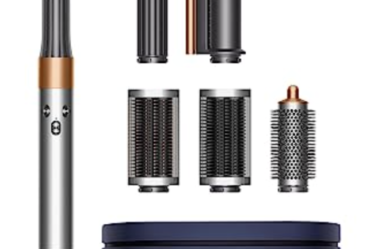
Cinder toffee, honeycomb, hokey-pokey, the stuff inside Crunchie bars … whatever you call it, this crunchy, caramelised treat is genuinely as much fun to make as it is to eat around a bonfire. The dramatic, chemical reaction involved can rival a catherine wheel for thrills, while any leftovers are, as New Zealanders will attest, absolutely delicious folded into ice-cream.
Prep 5 min
Cook 15 min
Makes More than you can eat
165g demerara sugar
165g caster sugar
60ml golden syrup
15g butter, diced, plus extra for greasing (optional)
A pinch of salt
1 tbsp bicarbonate of soda
1 A note on the sweet stuff
This is not a recipe for the sugar-averse – I’ve found the best flavour comes from a mix of caster (for ease of melting, though you could use ordinary white, if you’re patient) and demerara (for flavour), plus a dollop of sugar syrup to stop it crystallising. You could use honey, if you prefer, but I prefer golden syrup in this instance.
2 Combine the sugars, syrup and butter
Put both the sugars, the syrup, four tablespoons of cold water and the butter, if using, in a deep, heavy-based pan, then add a good pinch of salt. Fat-free butters are lighter and airier, but the richness of butter is worth the trade-off in my opinion – you could use coconut oil or similar if you’re keeping it vegan.
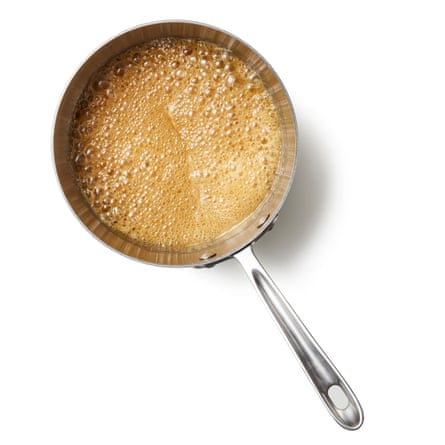
3 Melt slowly, then boil
Heat the pan gently, swirling it occasionally, until both the sugars and the butter have melted, then turn up the heat very slightly and bring everything to a boil. Simmer until the mix reaches 148C on a cooking thermometer, and is bubbling and amber in colour, which should take roughly 10 minutes.
4 Line a tin
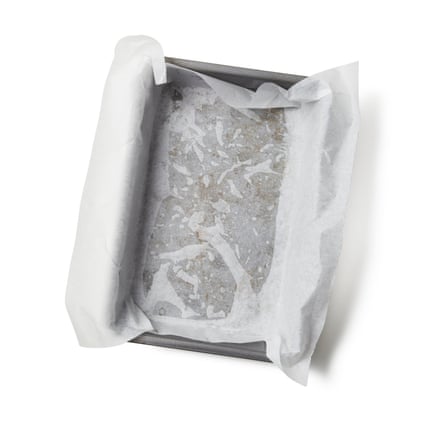
Keeping a watchful eye on the pan of molten sugar, line a roughly 24cm tin with greaseproof paper, pushing it well into the corners; grease the tin itself, if necessary, to help the paper stick. Put the tin and the bicarb within easy reach of the hob.
5 Add the bicarb
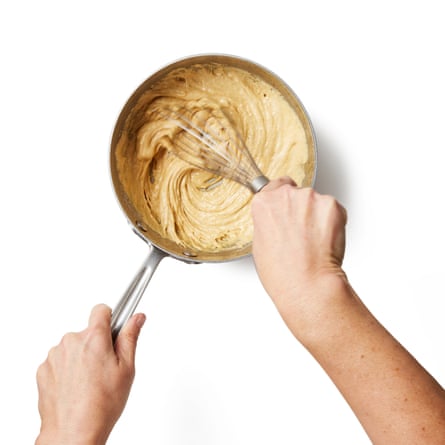
When the mixture reaches the desired temperature, take it off the heat and immediately whisk in the bicarbonate of soda; the mixture should foam up dramatically as the alkaline bicarb reacts with the acid in the sugar to create bubbles of carbon dioxide. Work quickly, to ensure there are no streaks of dry powder still visible.
6 Pour into the tin and cool
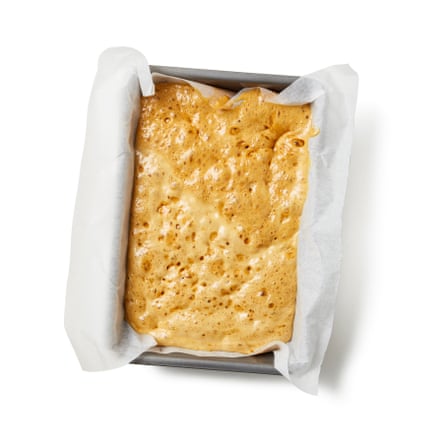
Pour the mixture into your lined tin and leave it to cool and set. After about 15 minutes, you can score it into pieces, to make it easier to break up once completely firm, though I prefer to turn out the cold toffee in its entirety and smash it into shards with a spoon. Store in an airtight container to prevent it turning sticky.
7 Alternative uses
Though you have to be careful mixing other ingredients into cinder toffee, because the sugar is so hot it can easily burn them, it does make great toffee apples. Wash the apples, giving them a good scrub if they’re shiny with wax, then dry them thoroughly so the toffee will adhere. Remove the stalks and poke in sticks, skewers or forks in their place.
8 … make toffee apples
Grease a baking tray and, once the toffee is ready, working as quickly as possible, dip each apple into it to coat, then put on the tray. Pour the remaining toffee into a greased tin as in step 5 (there will be less, because some is on the apples, so you’ll end up with a thinner result; if you want thicker chunks, simply use a smaller tray).
9 … or coat it in chocolate
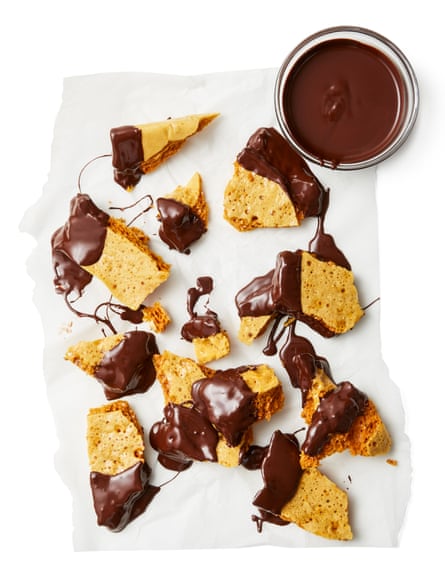
Cinder toffee is even nicer coated in chocolate, especially the bitter, dark kind. Leave it to cool completely, then dip it into melted chocolate and leave to set. I like to sprinkle the top with roughly chopped salted peanuts and a few chilli flakes, but customise to suit your own taste.


